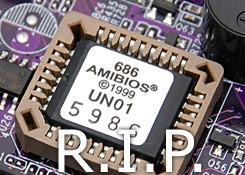 BIOS has been around since the invention of early PCs. It has been responsible for doing a routine check on the system hardware during boot, and then handover the OS loading (booting) process to the BootLoader by looking up the BootSector.
BIOS has been around since the invention of early PCs. It has been responsible for doing a routine check on the system hardware during boot, and then handover the OS loading (booting) process to the BootLoader by looking up the BootSector.
Evidently, it’s the one major part of the PC that’s still carried over from the PC’s ancient times,but the familiarly-clunky BIOS could soon be R.I.P., according to MSI. The motherboard makers including MSI vision newer and better replacement for the BIOS. MSI says it’s now making a big shift towards point and click UEFI (universal extensible firmware interface) systems, which is all set for the end of the year.
Though MSI will start to phase in UEFI starting from the end of this year, we can expect it will be widely adopted after three years.
According to the MSI mole, the first new UEFI products will be based on Intel’s Sandy Bridge chipset, featuring in motherboards from low-end budget ones to the top-notch models. After all, its not expensive, yet, more desirable.
Note: Sandybridge is the new Intel Architecture which is essentially successor of Nehalem. Sandy bridge uses 32nm fabrication methods from Westmere, but supports higher cores, bursts with Hyper threading.
UEFI is a continuation of Intel’s original EFI project, which was designed to replace the BIOS with a user-friendly point-and-click interface, as well as addressing many other troublesome areas of the PC’s legacy.
MSI introduced Click BIOS on a few motherboards based on Intel’s P45 chipsets.
The move to UEFI is now much more important because of its implications for storage coz as Seagate said, UEFI system would be an essential requirement in order for a PC to boot from a drive larger than 2TB.
This is how the MSI UEFI ClickBIOS from 2008 looks like:
The limitation of 2TB is seriously low and would force users to migrate to this new UEFI. Its obvious that mainstream notebooks will use almost 1TB of storage next year, not to mention desktop systems, so we need to start adoption of UEFI faster than ever.
Implementing a UEFI system isn’t an easy job for motherboard manufacturers used to working with standard BIOS technology, though. The motherboard manufacturers had held off moving to UEFI because of the huge resources you have to throw at it.
Issues with Migration to UEFI
There are a lot of issues to address here:
- First one is the size: A UEFI system is generally bigger than a traditional BIOS and most of the onboard ROM is not that big, so you can’t flash UEFI into a traditional BIOS board.
- Limited Mothboard Support: you have to use certain code with certain motherboards. Here’s Why: Motherboard companies spend a lot of time developing their own features and technology that distinguish their motherboards from those of the competition. If these features are designed to interface with the code in a traditional BIOS, then they may not be able to communicate with a UEFI system.
- Programming platform: UEFI is written in C, while BIOS is written in assembly code. But, this means that there’s much more flexibility with the code, it would become much more customizable, hackable to do things which were not easy to do with BIOS before.
UEFI is going under a lot of continuous work, but the final thing would be much more adaptable, customizable, feature-ful, hackable and yet cheap.
We write on Hardware, Open Source, Programming, Tech news, gadgets, Get them @taranfx on Twitter or Subscribe to us below:
loading...
loading...

![800px-IntelProcessorRoadmap.svg[1] 800px-IntelProcessorRoadmap.svg[1]](https://geeknizer.com/wp-content/uploads/800pxIntelProcessorRoadmap.svg1_thumb.png)

It's about time the old BIOS got an update, but as usual, we seem to be sacraficing security at the expense of innovation. When will designers take a security first approach?
-Tim Chin
Lead Problem Solver
http://www.cltechsolutions.com
loading...
loading...
coz?????
loading...
loading...
Well the new UEFI looks beautiful.. But the blue ancient environment of traditional BIOS looks more technical… I like the BIOS and this retro look that it has but it seems that this is the end. If a computer cannot boot from a 2TB drive then replacing it is a necessity. Demand for more storage increases exponentially. The transition is very close.
loading...
loading...
nice technology
loading...
loading...